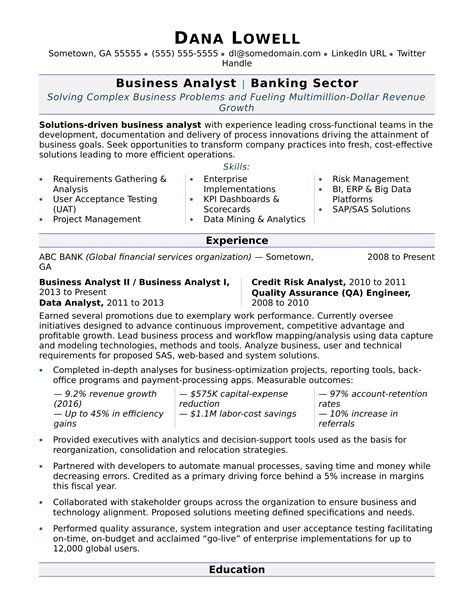Discover how we use data analysis, problem-solving, communication, and project management for effective SEO strategies. Maximize your online presence today.Are you looking to elevate your resume as a business analyst? Highlighting your key skills is essential to stand out in a competitive job market. In this blog post, we will discuss the top skills that every business analyst should showcase on their resume. From analyzing data and trends to mastering strategic problem-solving, effective communication, and project management proficiency, these skills are crucial for success in the field. By the end of this post, you’ll have a clear understanding of how to effectively demonstrate these skills on your resume and impress potential employers. Let’s dive into the essential skills that will make your resume shine in the business analysis industry.
Analyzing Data and Trends
As a business analyst, one of the most crucial skills you need to have on your resume is the ability to analyze data and trends. This involves not only gathering and interpreting data, but also being able to identify patterns and trends within the information you have. Being proficient in using data analysis tools such as Excel, SQL, or Tableau can be a great asset in demonstrating your ability to analyze and interpret data effectively.
Furthermore, being able to analyze trends in your industry or market can provide invaluable insights for decision-making within an organization. This involves staying up-to-date with industry reports, market research, and consumer behavior to identify emerging patterns and opportunities. Being able to translate this data into actionable insights for the business is a key skill for any business analyst.
Additionally, having experience with statistical analysis and data visualization techniques can showcase your ability to analyze data and trends in a way that is not only insightful but also easy to understand for stakeholders. Being able to effectively communicate your findings through visualizations such as graphs, charts, and dashboards can be a powerful tool in influencing decision-making within an organization.
Strategic Problem Solving
Strategic problem solving is an essential skill for any business analyst, as it enables them to identify and address complex challenges in the corporate world. One of the key components of strategic problem solving is being able to identify the root cause of a problem, rather than just addressing the symptoms. By taking a thoughtful and methodical approach, business analysts can develop effective strategies to overcome obstacles and drive the success of their organizations.
Another vital aspect of strategic problem solving is the ability to think critically and analytically. Business analysts must be able to gather and assess data from a variety of sources, and then use this information to make informed decisions. This may involve looking for trends and patterns in the data, as well as considering the potential implications of different courses of action. By carefully considering all available information, business analysts can develop strategic solutions that are both practical and effective.
Effective communication is also an important element of strategic problem solving for business analysts. It is essential to be able to present complex information in a clear and understandable way, whether it is to colleagues, clients, or other stakeholders. By communicating effectively, business analysts can build consensus and support for their proposed solutions, increasing the likelihood of successful implementation.
Effective Communication
Effective communication is one of the most important skills for a business analyst to possess. As a business analyst, you need to be able to clearly and concisely communicate complex ideas and data to various stakeholders within the company. This includes presenting findings and recommendations to senior leadership, as well as collaborating with cross-functional teams to gather and analyze data. Good communication skills not only help in conveying information effectively, but also in building strong relationships with colleagues and clients.
Another aspect of effective communication for business analysts is the ability to actively listen and ask the right questions. This is essential for understanding business needs and objectives, as well as for gathering requirements from stakeholders. By being an active listener, a business analyst can ensure that they truly understand what is being communicated and can ask the right questions to clarify any uncertainties.
Furthermore, effective communication also involves being able to adapt your communication style to different audiences. Whether you are presenting to technical teams or non-technical stakeholders, being able to tailor your communication to the specific audience is crucial for ensuring that your message is understood and well-received. This can mean using different levels of technical jargon, adjusting the level of detail in your presentations, or simply using different communication mediums based on the audience’s preferences.
Project Management Proficiency
Project management is an essential skill for any business analyst to have on their resume. Project management proficiency involves the ability to effectively plan, execute, and oversee the completion of various projects within an organization. It requires a deep understanding of project management methodologies and techniques, as well as the ability to collaborate with cross-functional teams to ensure project success.
Business analysts with project management proficiency are able to effectively prioritize tasks, set realistic timelines, and allocate resources efficiently. They are skilled in identifying and mitigating project risks, as well as adapting to unexpected changes in project scope or requirements. Moreover, their proficiency in project management allows them to effectively communicate project progress and results to stakeholders, ensuring that all relevant parties are informed and engaged throughout the project lifecycle.
Overall, business analysts who possess project management proficiency bring invaluable organizational and leadership skills to the table. They are able to drive project success by effectively managing resources, timelines, and risks, while also fostering strong collaboration and communication among project team members. Employers value this skill set highly, as it demonstrates the business analyst’s ability to deliver tangible results and drive impactful change within the organization.
